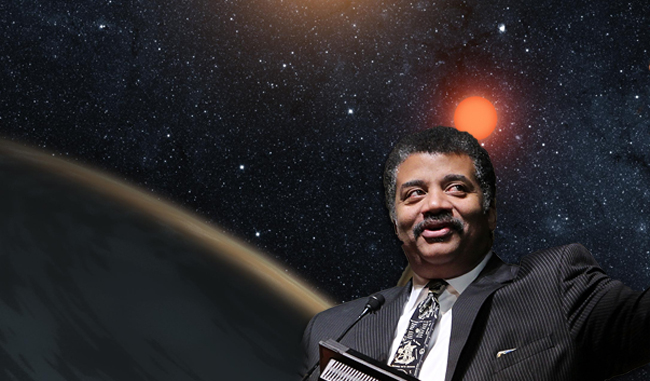
Simple systems of government can be deeply appealing, especially when people aren’t really feeling the system of government they’re currently working with. And Neil deGrasse Tyson has just proposed a new form of government, which is deeply appealing to rational people: Policy will be based on evidence. But there are a few problems.
What Is ‘Rationalia?’
Really, Tyson summed it up best himself:
Earth needs a virtual country: #Rationalia, with a one-line Constitution: All policy shall be based on the weight of evidence
— Neil deGrasse Tyson (@neiltyson) June 29, 2016
In other words, if you want to pass any sort of policy, it has to have real scientific evidence behind it. And this would seem, at first, appealing. Instead of arguing relentlessly, politicians would have to prove their statements. They’d have to use science to do it! And what’s more rational, considered, and careful than science?
Nothing, when it’s done by robots. Unfortunately, science is done by humans, frail, messy, complicated humans, and that in turn makes science frail, messy, and complicated. In fact, if you want to see just how bad “rational” policy can get, all you really have to do is look at the past mistakes of science, and the sometimes horrific uses politicians have put it to.
Science Is Supposed To Get It Wrong
In the 1700s, if you asked a rational man how things burn, he’d carefully explain that burning things are full of phlogiston. That theory would endure for a century before being debunked. Right around the time phlogiston was being disproved, Franz Joseph Gall, a German doctor, was developing the theory of phrenology, which boils down to figuring out what’s wrong with a person’s brain by feeling the bumps on their heads.
It’s worth noting that both of these theories were credible at the time because they best explained what we were observing. Once we discovered oxygen and its properties, scientists accepted phlogiston was a crock, and as neuroscience developed, phrenology was quietly set aside. Frankly, screwing up is an accepted, even celebrated, part of science. Two classical physicists, in the early 1900s, helped discover quantum physics by making a mistake. The man who theorized the existence of Pluto, Percival Lowell, got all the astronomy and physics wrong, but turned out to be right anyway.
The simple fact of the matter is that science is messy. In fact, science is supposed to be messy. Scientists are constantly correcting each other, checking each other’s results, and holding each other accountable. Little, if anything, is settled in science, and that makes it a poor foundation for policy. Any laws based on science would have to be just as constantly reviewed, questioned, and analyzed as science itself. Every conviction, every regulation, every decision would go under the scrutiny of lawyers. And this assumes the science in question would be objective and not carefully chosen to support what a few people want.
Science Can Be Misused
Since the turn of the century, scientists have been, more and more, raising concerns about the politicization of science. The Bush Administration was repeatedly accused, from within and without, of cherry-picking the results they wanted to hear and ignoring the rest.
Furthermore, this assumes the scientists themselves are honest. There are plenty of occasions where they’re not, and they rely on the ignorance of the general public and politicians to give them cover and, in more than a few cases, make them rich. Even if scientists are completely honest, they can still get it wrong and that error can take on a life of its own. The man who spawned the anti-gluten fad has disproven his own research, but you’ll notice people still think gluten is dangerous. Whenever some dude calls himself an alpha male, he’s referring to the research of L. David Mech, who has since determined he got it wrong and has pleaded with his publisher to take his claims off bookstore shelves to no avail.
Science Is A Starting Point, Not An End
None of this is to say that well-executed, peer-reviewed science shouldn’t be involved in policymaking. Politicians should call on scientists more and listen closely to what they have to say in issues where it’s relevant. But at the same time, we need to remember that new tools, new theories, and new ways of thinking can change what we know to be “true” in science in a heartbeat. Science is not stone, but ever-shifting sand, and if a branch of science collapses, scientists just take what they need from the wreckage and start building again. Government, though, holds the lives of the governed in its hands, and when lives are at stake? You build on stone.
